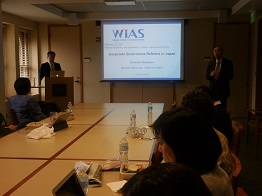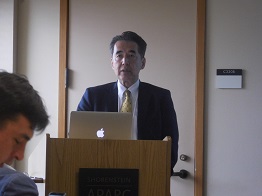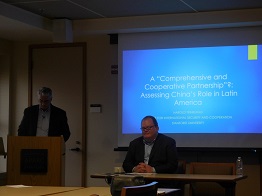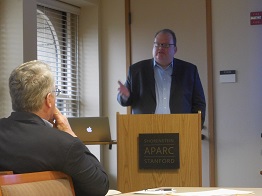Stanford Seminars on Japan & China on Feb. 1, 2017 [Report]
Stanford Seminars on Japan and China
Date: February 1(W), 2017
Venue: Philippines Conference Room, Encina Hall, Stanford Univeristy
1) 12:00-1:30pm
"Corporate Governance Reform in Japan": Japan Colloquium Series
Speaker: Hideaki Miyajima (Waseda University)
Moderator/Commentator: Takeo Hoshi (FSI, Stanford University)
(From seminar abstract):
Since Abenomics launched corporate governance reforms as the third arrow of its policies mix, a series of reform measures were introduced such as Stewardship Code, Corporate Governance Code, organizing JPX 400 by Tokyo Stock Exchange. In this presentation, first, recent changes of governance arrangement in Japanese firms are summarized, and some agenda for further reforms is suggested.


Prof. Hideaki Miyajima: http://www.rieti.go.jp/users/miyajima-hideaki/
(English) http://www.rieti.go.jp/users/miyajima-hideaki/index_en.html
(Miyao's report):
Very informative presentation about recent developments in corporate governance reform in Japan. A more detailed account of current issues on this subject matter should be found in Prof. Miyajima's forthcoming book "Corporate Governance and Growth Strategy" (「企業統治と成長戦略」to be published soon, as he pointed out. From the viewpoint of economic theorists like myself, it was quite interesting to hear from him that the current "hybrid" arrangement of Japanese corporate organization, combining the traditional "Japan model" and the "US model" of corporate governance, appears to be stable, contrary to theoretical intuition. Prof. Miyajima did not provide an explanation about this stability property, other than saying that many of the Japanese representative firms seem to have been in some hybrid situation for more than a decade without showing any sign to go to either the purely Japanese or US model. Hopefully in his forthcoming book, at least some more detailed, especially theoretical, account will be presented to persuade both theorists and empiricists on this matter.
2) 4:30-6:00pm
"A 'Comprehensive and Cooperative Partnership'?: Assessing China's Role in Latin America": Asia-Pacific Research Center Event
Speaker: Harold Trinkunas (Center for Int'l Security & Cooperation, Stanford)
Moderator/Commentator: Thomas Fingar (FSI, Stanford Univ.)
(From seminar abstract):
Latin American trade with China has grown exponentially since 2000. Major loans and investments also add to China’s growing role in the region’s economy. China has become an important alternative for capital, trade and technology for Latin America, but without the policy conditionality that regional governments have traditionally experienced in relations with developed countries. As part of a project on China-Latin American relations at the Brookings Institution, Harold Trinkunas assesses how China’s growing economic relations actually influence politics and policies across the region.


Harold Trinkunas: http://cisac.fsi.stanford.edu/people/harold-trinkunas
Thomas Fingar: http://aparc.fsi.stanford.edu/people/thomas_fingar
(Miyao's report):
Very comprehensive and balanced analysis of China's political, economic, and strategic influence in the Latin American region. However, the bottom line conclusion of the speaker's (and the commentator's) argument was something like "China's influence on Latin America in the foreseeable future would be more limited than generally perceived, regardless of what happens to the both Chinese and American sides (even under the Trump administration), in view of the long-term relationship between Latin America and the advanced Western countries, especially the US, still dominating Latin American economies," a view which is not so easily subscribed to by Asian observers like myself, who are more concerned about China's hegemony in Asia and the Pacific-rim region including some Latin American countries, especially in the aftermath of the failure of TPP. as I questioned to these two specialists, who answered my question by saying that the US could effectively deal with Pacific-rim nations even in a bilateral fashion, as US President Trump suggested. We all hope so.
-------------------------------------------------------------------------------------------
Date: February 1(W), 2017
Venue: Philippines Conference Room, Encina Hall, Stanford Univeristy
1) 12:00-1:30pm
"Corporate Governance Reform in Japan": Japan Colloquium Series
Speaker: Hideaki Miyajima (Waseda University)
Moderator/Commentator: Takeo Hoshi (FSI, Stanford University)
(From seminar abstract):
Since Abenomics launched corporate governance reforms as the third arrow of its policies mix, a series of reform measures were introduced such as Stewardship Code, Corporate Governance Code, organizing JPX 400 by Tokyo Stock Exchange. In this presentation, first, recent changes of governance arrangement in Japanese firms are summarized, and some agenda for further reforms is suggested.


Prof. Hideaki Miyajima: http://www.rieti.go.jp/users/miyajima-hideaki/
(English) http://www.rieti.go.jp/users/miyajima-hideaki/index_en.html
(Miyao's report):
Very informative presentation about recent developments in corporate governance reform in Japan. A more detailed account of current issues on this subject matter should be found in Prof. Miyajima's forthcoming book "Corporate Governance and Growth Strategy" (「企業統治と成長戦略」to be published soon, as he pointed out. From the viewpoint of economic theorists like myself, it was quite interesting to hear from him that the current "hybrid" arrangement of Japanese corporate organization, combining the traditional "Japan model" and the "US model" of corporate governance, appears to be stable, contrary to theoretical intuition. Prof. Miyajima did not provide an explanation about this stability property, other than saying that many of the Japanese representative firms seem to have been in some hybrid situation for more than a decade without showing any sign to go to either the purely Japanese or US model. Hopefully in his forthcoming book, at least some more detailed, especially theoretical, account will be presented to persuade both theorists and empiricists on this matter.
2) 4:30-6:00pm
"A 'Comprehensive and Cooperative Partnership'?: Assessing China's Role in Latin America": Asia-Pacific Research Center Event
Speaker: Harold Trinkunas (Center for Int'l Security & Cooperation, Stanford)
Moderator/Commentator: Thomas Fingar (FSI, Stanford Univ.)
(From seminar abstract):
Latin American trade with China has grown exponentially since 2000. Major loans and investments also add to China’s growing role in the region’s economy. China has become an important alternative for capital, trade and technology for Latin America, but without the policy conditionality that regional governments have traditionally experienced in relations with developed countries. As part of a project on China-Latin American relations at the Brookings Institution, Harold Trinkunas assesses how China’s growing economic relations actually influence politics and policies across the region.


Harold Trinkunas: http://cisac.fsi.stanford.edu/people/harold-trinkunas
Thomas Fingar: http://aparc.fsi.stanford.edu/people/thomas_fingar
(Miyao's report):
Very comprehensive and balanced analysis of China's political, economic, and strategic influence in the Latin American region. However, the bottom line conclusion of the speaker's (and the commentator's) argument was something like "China's influence on Latin America in the foreseeable future would be more limited than generally perceived, regardless of what happens to the both Chinese and American sides (even under the Trump administration), in view of the long-term relationship between Latin America and the advanced Western countries, especially the US, still dominating Latin American economies," a view which is not so easily subscribed to by Asian observers like myself, who are more concerned about China's hegemony in Asia and the Pacific-rim region including some Latin American countries, especially in the aftermath of the failure of TPP. as I questioned to these two specialists, who answered my question by saying that the US could effectively deal with Pacific-rim nations even in a bilateral fashion, as US President Trump suggested. We all hope so.
-------------------------------------------------------------------------------------------
2017-02-02 03:00
コメント(0)
トラックバック(0)




コメント 0
コメントの受付は締め切りました